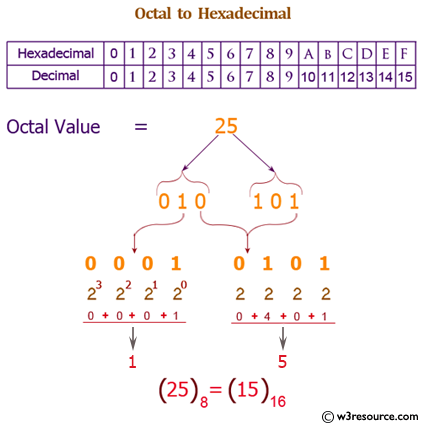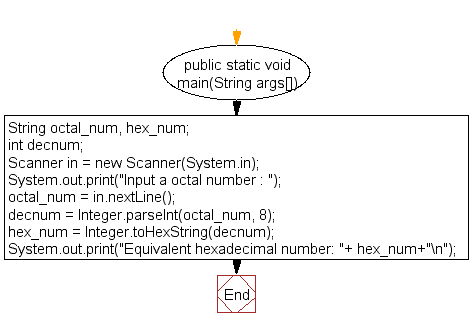Java Exercises: Convert a octal number to a hexadecimal number
Java Basic: Exercise-27 with Solution
Write a Java program to convert a octal number to a hexadecimal number.
Octal number: The octal numeral system is the base-8 number system, and uses the digits 0 to 7.
Hexadecimal number: This is a positional numeral system with a radix, or base, of 16. Hexadecimal uses sixteen distinct symbols, most often the symbols 0-9 to represent values zero to nine, and A, B, C, D, E, F (or alternatively a, b, c, d, e, f) to represent values ten to fifteen.
Test Data:
Input any octal number: 100
Pictorial Presentation: Octal to Hexadecimal number

Sample Solution:
Java Code:
import java.util.Scanner;
public class Exercise27 {
public static void main(String args[])
{
String octal_num, hex_num;
int decnum;
Scanner in = new Scanner(System.in);
System.out.print("Input a octal number : ");
octal_num = in.nextLine();
decnum = Integer.parseInt(octal_num, 8);
hex_num = Integer.toHexString(decnum);
System.out.print("Equivalent hexadecimal number: "+ hex_num+"\n");
}
}
Sample Output:
Input a octal number : 100 Equivalent hexadecimal number: 40
Flowchart:

Java Code Editor:
Contribute your code and comments through Disqus.
Previous: Write a Java program to convert a octal number to a binary number.
Next: Write a Java program to convert a hexadecimal to a decimal number.
What is the difficulty level of this exercise?
Test your Programming skills with w3resource's quiz.
Java: Tips of the Day
How to sort an ArrayList?
Collections.sort(testList); Collections.reverse(testList);
That will do what you want. Remember to import Collections though!
Ref: https://bit.ly/32urdSe
- New Content published on w3resource:
- HTML-CSS Practical: Exercises, Practice, Solution
- Java Regular Expression: Exercises, Practice, Solution
- Scala Programming Exercises, Practice, Solution
- Python Itertools exercises
- Python Numpy exercises
- Python GeoPy Package exercises
- Python Pandas exercises
- Python nltk exercises
- Python BeautifulSoup exercises
- Form Template
- Composer - PHP Package Manager
- PHPUnit - PHP Testing
- Laravel - PHP Framework
- Angular - JavaScript Framework
- Vue - JavaScript Framework
- Jest - JavaScript Testing Framework
